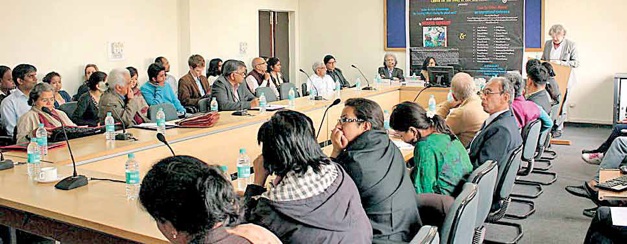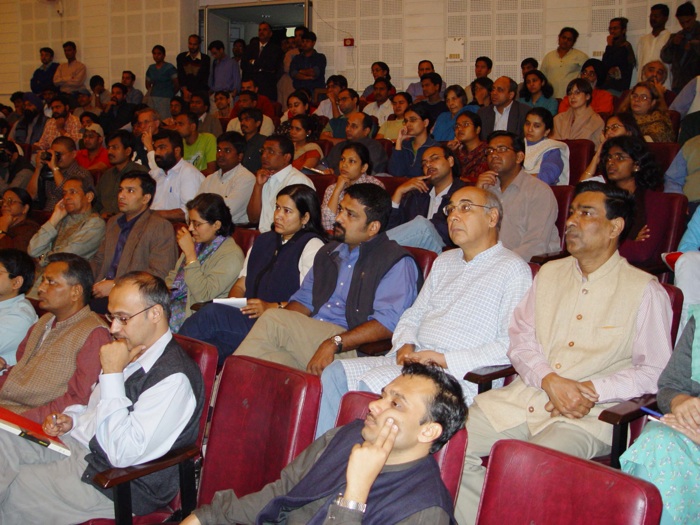
| Professor Boaventura de Sousa Santos,University of Coimbra, Portugal: Is it Possible to Occupy the Law? on 5 February 2014, Chair: Professor Niraja Gopal Jayal. | 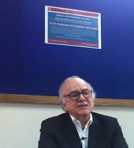 |
| Professor Peter Joachim Katzenstein, Walter S. Carpenter, Jr. Professor of International Studies, Cornell University: Uncertainty, Risk and the Financial Crisis of 2008 on 06 November 2013. Prof Varun Sahni, JNU presided. | 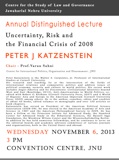 |
| Justice Dr. S. Muralidhar, Delhi High Court delivered a series of three lectures on Socio-Economic Rights on 23-24 August 2013. | 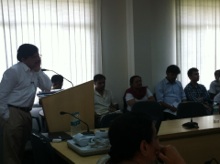 |
| Professor Patrick Heller, Brown University: Growth and Citizenship in Indian Cities: A Comparative Perspective on 19 November 2012. Prof. Sudha Pai, Rector, JNU presided. |  |
|
Prof. Atul Kohli, David K.E. Bruce Professor, of International Affairs and Professor of Politics and International Affairs at Princeton University, Princeton on Regional Diversities in India's Development on 15 January 2011.
|
|
|
Professor Sally E. Merry, Professor of Anthropology, New York University on Measuring the World: Indicators, Human Rights, and Global Governance on 13 August 2010.
|
|
| Professor Jane Kelsey, Auckland University, New Zealand: Embedding Neoliberalism In A Post-Neoliberal World: The Role of Free Trade Agreements on 28 November 2008. |  |
|
Justice Nasir Aslam Zahid (Retd.), Former Chief Justice, Sindh High Court , Justice Pakistan Supreme Court and Dean, Law College, Hamdard University on Challenges of Access to Justice in South Asia on 19 February 2008.
|
|
|
Prof. Marc Galanter, the John and Rylla Bosshard Professor of Law and South Asian Studies at the University of Wisconsin-Madison and LSE Centennial Professor at the London School of Economics and Political Science on Everyday Justice in India on 16 January 2008.
|
|
|
Mr. Wajahat Habibullah, Chief Information Commissioner, on RTI - A Step towards a Democratic Empowerment of Ordinary Citizens on 14 January 2008.
|
|
|
Justice K G Balakrishnan, Chief Justice of India on Millennium Development Meet on Legal Literacy & Access to Justice on 1 November 2007.
|
|
|
Prof. Giorgio Agamben, Università IUAV di Venezia & Collège International de Philosophie Paris on What is a Dispositif? on 16 January 2007.
|
|
|
Prof Pranab Bardhan on Democracy, Governance, and Economic Reform in India on 13 January 2006.
|
|
|
Professor N.R. Madhava Menon, then Director, the National Judicial Academy, Bhopal: Social Context Judging for Social Justice Delivery on 25 November 2005.
|
|
|
Prof Bob Jessop, Director, Institute for Advanced Studies in Management and Social Sciences, Lancaster University, Lancaster, UK on Governance Failure, Meta-governance and the Need for Romantic Public Irony on 11 February 2005.
|
|
| Professor Sunil Khilnani then at the Johns Hopkins University, Washington D.C.: Nehru’s Judgement on 23 November 2004. |  |
| Prof John Keane, University of Westminster, UK, on Cosmocracy: Reflections on Global Governance on 27 February 2004. |  |
|
Dr. K. Kannabiran on Law and the Question of Sexual Harassment at the Workplace [in collaboration with the Gender Sensitisation Committee Against Sexual Harassment (GSCASH), JNU] in December 2003.
|
|
|
Professor Kaushik Basu, Cornell University: Global Labour Standards and Local Freedom: What Should India’s Position Be? on 14 November 2003.
|
|
|
Sir Rob Young, High Commissioner of the United Kingdom in India on Good Governance in the UK on 8 September 2003.
|
|
|
Mr. Soli Sorabjee, then Attorney-General for India: Essentials of Good Governance on 15 November 2002.
|
|
